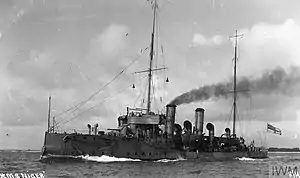HMS Niger (1892)
HMS Niger was a torpedo gunboat launched in 1892, converted to a minesweeper in 1909, and sunk in 1914 by the German submarine SM U-12 near Deal.
 Niger | |
| History | |
|---|---|
| Name | Niger |
| Builder | Naval Construction & Armament, Barrow |
| Laid down | 17 September 1891 |
| Launched | 17 December 1892 |
| Commissioned | 25 April 1893 |
| Fate | Torpedoed and sunk, 11 November 1914 |
| General characteristics | |
| Class and type | Alarm-class torpedo gunboat |
| Displacement | 810–835 long tons (823–848 t) |
| Length | 74 m (242 ft 9 in) |
| Beam | 33 m (108 ft 3 in) |
| Draught | 8.2 m (26 ft 11 in) |
| Propulsion | 2 three-cylinder steam engines |
| Speed | 18.7 knots (34.6 km/h; 21.5 mph) |
| Complement | 91 |
| Armament |
|
Early history
The ship was ordered from Naval Construction & Armament, Barrow, and laid down on 17 September 1891. She was launched on 17 December 1892 and commissioned on 25 April 1893.[1]
Niger was the training ship for and tender to HMS Vernon.
In 1902 she had a major refit at the Palmers Shipbuilding Company, where she was fitted with new and larger engines, and with Reed water tube boilers.[2] On her completion she relieved HMS Jaseur as tender to Vernon.[3]
Sinking of HMS Niger
On the morning of 11 November a U-boat attack occurred off Deal. Around noon there was an explosion and black smoke rose from HMS Niger. Niger was at anchor about two miles (3.2 km) off the pier at Deal when she was torpedoed and sunk before noon on 11 November 1914 by the German submarine SM U-12.[4] Niger was the first ship sunk by U-boat commander Walther Forstmann. Forstmann was one of the most successful commanders of the Imperial German Navy in the First World War.[5] She was also the first Allied ship to be sunk by German submarines based at the newly captured Belgian naval bases.[6]
Many who were tracking the fighting from onshore saw the explosion and the smoke. Even though there were high winds and huge waves, boats went to the sinking ship and were able to take the crew off. Some of Niger's sailors were eating lunch when the torpedo hit and so were only lightly dressed. All officers, but only 77 men of Niger's crew survived the sinking, four people were injured.[7] Lieutenant-Commander Arthur Thomas Muir, who commanded the ship remained on the bridge until the rest of the crew had left.[8] He suffered serious injuries in the explosion.[8] The injured were taken to the nearby Royal Naval Hospital.
When HMS Niger was attacked there were about 100 other ships nearby. One of these had a Dutch flag and was moored very close to Niger and then suspiciously disappeared after the attack. The British Admiralty suspected it to be a German spy ship.[9]
The commander of the naval squadron, that HMS Niger was a member of, was Geoffrey Spicer-Simson who would later become famous for commanding a small flotilla which defeated a superior German force during the Battle for Lake Tanganyika.[10][11] At the time of the sinking of Niger, Spicer-Simson was visiting his wife and some of her lady friends at a nearby hotel.[10]
Notes and references
Notes
- Helgason, Guðmundur. "Ships hit during WWI: HMS Niger". German and Austrian U-boats of World War I - Kaiserliche Marine - Uboat.net. Retrieved 4 May 2016.
- "Naval & Military intelligence". The Times. No. 36861. London. 1 September 1902. p. 8.
- "Naval & Military intelligence". The Times. No. 36905. London. 22 October 1902. p. 9.
- Cocker 2006, p. 74
- Helgason 2014
- Linfoot 1914
- Poverty Bay Herald 1914, p. 7
- The Illustrated War News 1914, p. 6
- The Daily Gate City 1914, p. Front Cover
- Foden 2004, p. NY Times Excerpt
- Macintyre 2005
References
- Brown, Les (2023). Royal Navy Torpedo Vessels. Barnsley, UK: Seaforth Publishing. ISBN 978-1-3990-2285-9.
- Cocker, M. P. & Maurice Cocker (2006). Coastal Forces Vessels of the Royal Navy from 1865. Tempus. ISBN 9780752438627. - Total pages: 256
- Foden, Giles (2004). Mimi and Toutou Go Forth: The Bizarre Battle for Lake Tanganyika. Michael Joseph. ISBN 0718145550. - Total pages: 320
- Helgason, Guðmundur (2014). "WWI Sub Aces". uboat.net. Retrieved 11 March 2015.
- Linfoot, Arthur L (14 November 1914). "14 November 1914; Saturday". Denis Linfoot. Retrieved 11 March 2015.
- Macintyre, Ben (10 April 2005). "'Mimi and Toutou's Big Adventure': He Wore a Khaki Skirt". The New York Times. Retrieved 11 March 2015.
- Pbenyon (2015). "HMS Niger at the Index of 19th Century Naval Vessels". Index of 19th Century Naval Vessels. Archived from the original on 2 April 2015. Retrieved 11 March 2015.
- Poverty Bay Herald (31 December 1914). "Sinking of HMS Niger". Poverty Bay Herald. ISSN 1170-0432. Retrieved 11 March 2015.
- The Daily Gate City (12 November 1914). "The Daily Gate City". The Daily Gate City. ISSN 2375-3056. OCLC 9299506. Retrieved 11 March 2015.
- The Illustrated War News (18 November 1914). "HMS Niger". The Illustrated War News, Number 15. Retrieved 11 March 2015.